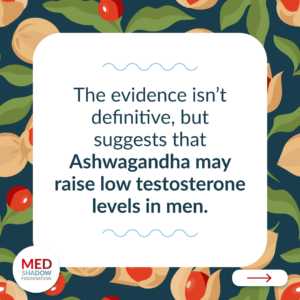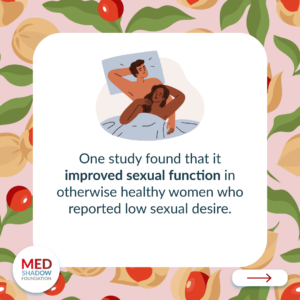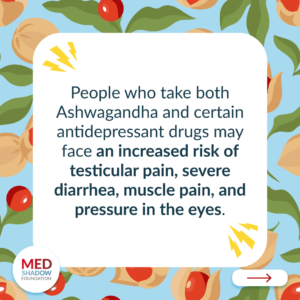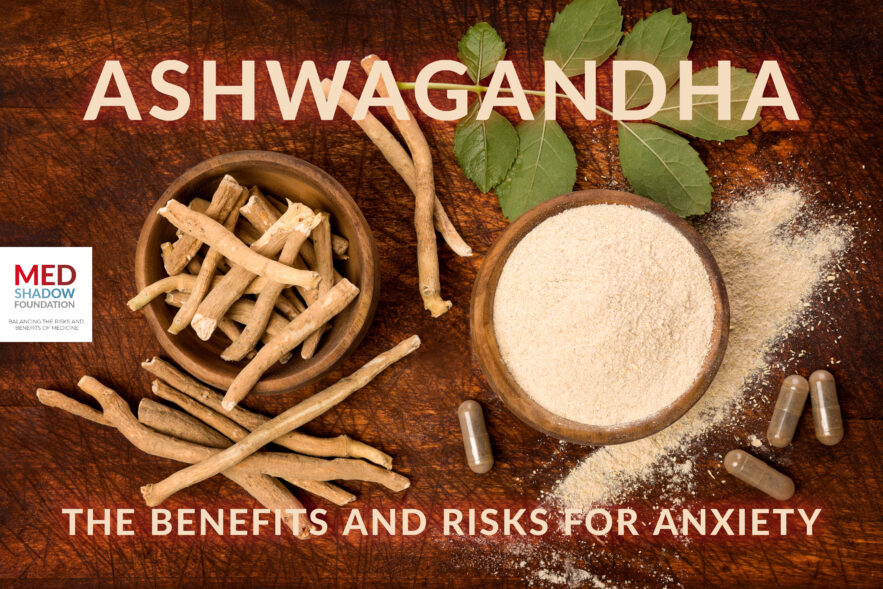If you have heard about the latest craze of taking the supplement known as Ashwagandha for anxiety, you are not alone. There is certainly a buzz around this popular supplement. But what exactly is it, and what can ashwagandha do for you?
Todd Miller had been taking Wellbutrin, an antidepressant, when he decided to add ashwagandha to his regimen about two years ago. He doesn’t remember where he heard about ashwagandha, but he says, “I always felt like [wellbutrin] made me sort of sluggish and slow.”
With ashwagandha, he says, he not only feels that his depression is managed, but he feels more energetic. Note: you should never abruptly stop taking antidepressants. Doing so can cause withdrawal symptoms, including suicidal ideations. Be sure to discuss how to taper off of them with your healthcare provider.
Ashwagandha is not a new supplement, but it’s been gaining popularity, especially based on the fact that it may help with stress and anxiety, especially given that four in 10 adults have the condition(s). But, is ashwagandha safe? And does it really work?
Here’s what you need to know about the benefits and possible side effects of adding ashwagandha to your wellness routine.
What Is Ashwagandha?
“Ashwagandha has been a supplement being used by humans for 1000s of years. It’s kind of had a bit of a comeback, I would say, over the last five to 10 years, and there has been more and more research done on ashwagandha,” Katie Jantz, RPh, MSc in human nutrition, and a researcher at examine.com.

Ashwagandha is a shrub that grows in India, Africa, and the Middle East. It contains chemicals called “
withanolides,”which are thought to be responsible for its broad beneficial effects on the body and mind. Manufacturers extract these chemicals to make supplements.
You can find ashwagandha supplements as pills, teas, powders and more.
Ashwagandha Benefits
“Historically, in integrative medicine, it was used to promote health and wellness, vitality, and increased strength. It was used as an aphrodisiac. You had all of these widespread benefits,” says Jantz.
While there aren’t large clinical trials for supplements like we often have to test the effects of FDA-approved drugs, she adds that, “ A lot of the preliminary research in both animal models and humans has actually supported a lot of those claims. Ashwagandha does seem to interact with the body in a widespread way and produce a lot of potentially beneficial effects.”
Is Ashwagandha Good for Anxiety?
Scientists have found that ashwagandha is effective at reducing anxiety. In doing so, it may also help improve your sleep and ability to focus. Jantz says that the supplement seems to be most effective for those who report the highest levels of stress and who are in chronically stressful situations that they anticipate lasting for months more.

Ashwagandha Benefits for Men
The evidence isn’t definitive, but it suggests that ashwagandha may raise low testosterone levels in men. The existing research mainly focuses on rats with diabetes, and men with low fertility. Both groups saw increases in testosterone after being given ashwagandha. Infertile men also had more high quality sperm after three months of taking ashwagandha.
Ashwagandha Benefits for Women
There’s less research specific to ashwagandha’s effect on women’s health. One study found that it improved sexual function in otherwise healthy women who reported low sexual desire. Another study found that the supplement helped women going through menopause increase estrogen levels and reduce menopausal symptoms.

How Ashwagandha Works
“It is still early in our understanding of how exactly it is working in the body to create these effects, and what that means long term,” says Jantz. What we do know is that the supplement seems to consistently reduce levels of cortisol, the stress hormone, and it may interact with hormones and signaling chemicals in the brain. The exact mechanism of how ashwagandha influences these systems however, “is poorly understood,” says Jantz.
What Are the Side Effects of Taking Ashwagandha?
For the most part, ashwagandha is well tolerated, says Jantz. However, some people may feel drowsy or experience nausea after taking it. If you feel tired but want to keep using ashwagandha, you can always just take the supplement before bed rather than earlier in the day, explains Jantz.

It’s important to note that while some of ashwagandha’s most convincing impacts are in those who are under chronic stress, researchers have found that people who take both ashwagandha and certain antidepressant drugs may face an increased risk of side effects such as testicular pain, severe diarrhea, muscle pain, and pressure in the eyes.
In rare cases, ashwagandha may damage your liver. Most studies only last a few months, so it’s not clear if the supplement has long term effects—positive or negative.
Who Should Avoid Ashwagandha?
Any time you’re considering taking a new supplement, you should discuss it with your healthcare provider or pharmacist, but with ashwagandha, it may be especially important to do so If you take antidepressants or have a hormonal condition such as polycystic ovary syndrome (PCOS) or hormone-sensitive prostate cancer, in which higher levels of testosterone may worsen your symptoms.

Scientists also do not know whether ashwagandha is safe during pregnancy or breastfeeding, so it’s best to avoid the supplement if you are, or are planning to become pregnant.
Does Ashwagandha ‘Kill’ Emotions?
Imran Ahmed was working full time, while also trying to start up a business of his own. When the stress became difficult to handle, he found a YouTube video recommending ashwagandha. Not only would it help with his stress, but it might help improve his strength during workouts, too.
After taking it, he says, “I felt level-headed and present in the moment. It was like a weight was lifted off my shoulders. I would tackle difficult tasks head-on rather than let anxiety build up,” he says. However, he adds that, “I realized about three weeks later, that while I wasn’t stressed, I really didn’t feel like pursuing my entrepreneurial goals. It all felt so ‘unnecessary’ as I recall.”
When Ahmed stopped taking ashwagandha, he felt like his old energetic self. Now, he says, he’ll only take it during short periods of intense stress, lasting two weeks or less.
And Ahmed’s not the only one. Many TikTok users claim the supplement blunts their emotions over time. While the ashwagandha is known to reduce cortisol, which may help regulate emotions like anxiety, there is no evidence currently from research that it blunts all or other emotions.
How to Choose an Ashwagandha Supplement
Vitamins and supplements don’t get the same scrutiny from the FDA as drugs. The benefits and risks listed above are based on the assumption that your supplement contains exactly what is listed on the label, and nothing else. However, study after study has found that supplements can be tainted with pharmaceuticals or other contaminants that may cause additional side effects.
One way to reduce your risk is to check the label for a certification that the supplement has been tested by a third party. Groups like the National Science Foundation (NSF) or the United States Pharmacopeia (USP) test supplements to confirm that they contain the products listed on the label and don’t have unsafe levels of contaminants.
Jantz adds that in addition to checking for third party testing, you should also scour the label to make sure that the formulation you’re buying has a standardized amount of the active ingredients, withanolides.
“It should be standardized to a certain percent of Withanolides,” says Jantz. This might look like a percentage of withanolides listed on the side of the bottle, she explains.






